Imagine embracing a dietary regimen that is both delectable and profoundly beneficial to your health. This is the essence of the Mediterranean diet, drawing inspiration from the culinary traditions of the countries bordering the Mediterranean Sea.
It is renowned for enhancing cardiovascular health, aiding in weight management, and fostering overall wellness.
The Mediterranean diet emphasizes the consumption of an array of wholesome foods such as fresh fruits and vegetables, whole grains, and lean proteins.
However, it transcends a mere diet; it embodies a lifestyle that exalts the delight of flavorful and nutritious meals. Are you prepared to transform your dietary practices?
Let us explore the fundamental elements of the Mediterranean diet and discover how you can begin to savor these healthful and appetizing foods today.
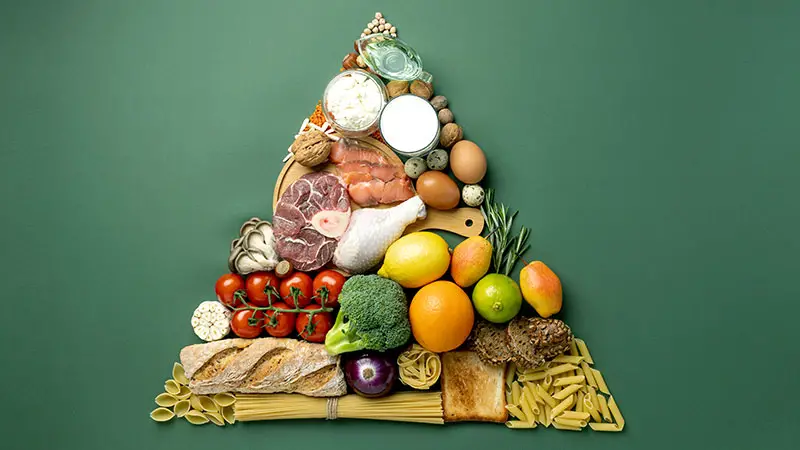
What Is the Mediterranean Diet?
The Mediterranean diet is more than just a set of eating guidelines; it’s a way of life. You focus on whole grains, fruits, vegetables, beans, and lentils, resembling the traditional foods of the Mediterranean Sea region. These foods offer a rich supply of fiber, vitamins, and minerals.
Including seafood and healthy fats like olive oil and nuts provides essential omega-3 fatty acids. This means you can enjoy dishes like grilled salmon with a drizzle of olive oil. Scallops, shrimp, and mackerel also fit well in this dietary pattern.
Moderation defines the consumption of chicken, turkey, eggs, and fermented dairy like yogurt or kefir. You can still savor these foods without overindulging.
Red meat, sweets, and processed foods are limited, helping you maintain a balanced intake and avoid unnecessary calories.
Home cooking is emphasized. Preparing meals at home lets you control the ingredients and enjoy the process.
Sharing meals with others enhances your connection to food and community. Exercise, like walking, plays a crucial role in the Mediterranean lifestyle. It promotes physical activity, which is as important as the foods you eat.
Health Benefits of the Mediterranean Diet
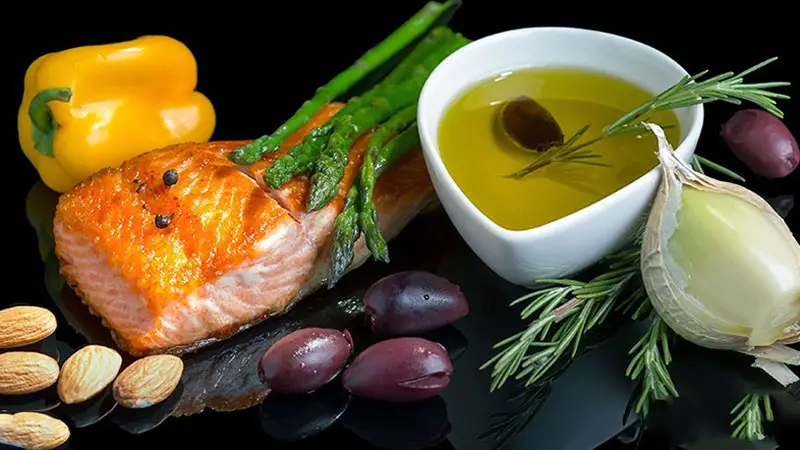
The Mediterranean diet offers numerous health benefits by focusing on whole foods and balanced nutrition. This section details its positive impacts on cardiovascular, metabolic, and brain health, as well as its role in cancer prevention and longevity.
Cardiovascular Health
Consuming a Mediterranean diet significantly reduces the risk of heart disease. Foods like olive oil and nuts provide healthy fats that help lower bad cholesterol levels.
Adding fatty fish like salmon, rich in omega-3 fatty acids, further supports cardiovascular health by reducing inflammation and improving blood vessel function.
Metabolic Health
This diet greatly improves metabolic health by emphasizing whole grains and fiber-rich foods. Consuming legumes, beans, and whole grains ensures stable blood sugar levels and reduces the risk of type 2 diabetes.
Moderating portions of lean proteins while limiting red meat and sweets helps maintain a healthy weight, combating obesity.
Brain Health
Eating Mediterranean foods supports cognitive function and reduces the risk of neurodegenerative diseases.
Antioxidant-rich fruits and vegetables prevent oxidative stress, which can damage brain cells. Nuts and seeds offer essential vitamins and minerals like vitamin E, known to improve brain health.
Cancer Prevention
Adhering to this diet decreases the risk of various cancers. A high intake of fruits, vegetables, and whole grains provides phytochemicals and antioxidants that protect cells from damage.
Minimizing processed foods and red meat reduces exposure to carcinogens, supporting long-term health.
Longevity
The Mediterranean diet is linked to increased longevity. Its balanced nutrition, rich in vitamins and minerals, promotes overall wellness.
Emphasizing plant-based foods and healthy fats slows aging processes. Regular physical activity and communal meals, inherent to the Mediterranean lifestyle, further contribute to a longer, healthier life.
Mediterranean Diet Food List
The Mediterranean diet prioritizes whole, nutrient-dense foods that foster health and wellness. Understand the key components to incorporate these into your daily life. Here is the written list from the Mediterranean Diet food chart:
Vegetables and Tubers:
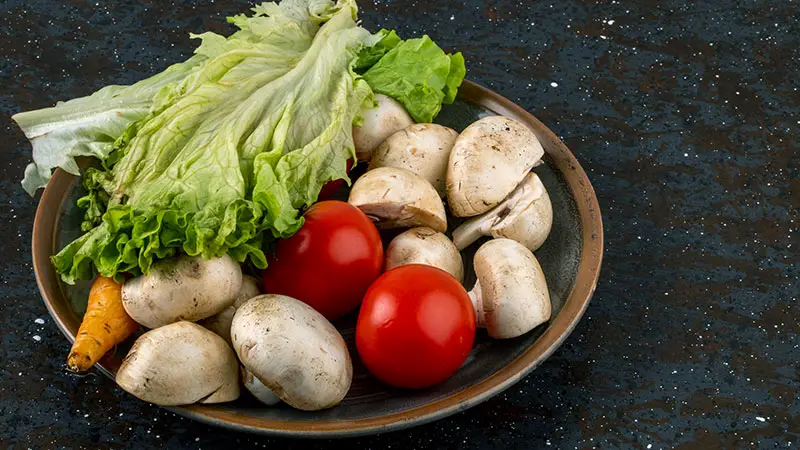
- Acorn squash
- Artichokes
- Arugula
- Beets
- Bell peppers
- Broccoli
- Brussels sprouts
- Butternut squash
- Cabbage
- Carrots
- Celery
- Cucumber
- Eggplant
- Kale
- Lettuce
- Okra
- Potatoes (red, white, sweet)
- Radishes
- Zucchini
Fruits:

- Avocados
- Apples
- Apricots
- Bananas
- Blueberries
- Cantaloupe
- Cherries
- Clementines
- Dates
- Figs
- Grapefruit
- Grapes
- Honeydew
- Olives
- Oranges
- Peaches and nectarines
- Pears
- Pomegranate
- Raspberries
- Strawberries
- Tomatoes
- Watermelon
Grains:
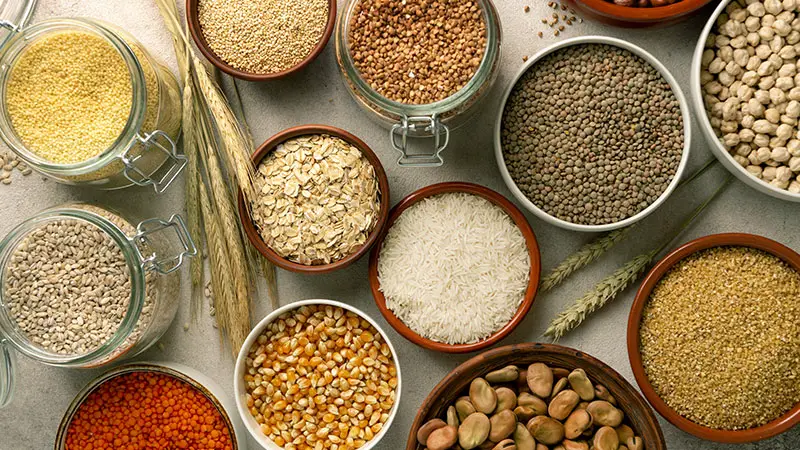
- Barley
- Brown rice
- Buckwheat
- Bulgur
- Couscous
- Durum
- Farro
- Quinoa
- Millet
- Oats
- Polenta
- Whole-grain bread
- Whole-grain pasta
- Wild rice
Nuts, Seeds, and Legumes
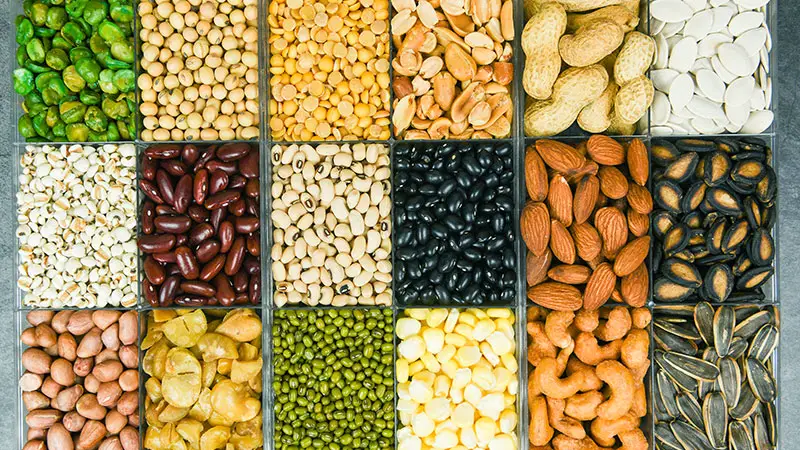
- Almonds
- Brazil nuts
- Cannellini beans
- Chia seeds
- Chickpeas
- Fava beans
- Green beans
- Flaxseed
- Hazelnuts
- Hemp seeds
- Kidney beans
- Lentils
- Pine nuts
- Pistachios
- Sesame seeds
- Sunflower seeds
- Walnuts
Sample Mediterranean Diet Meal Plan
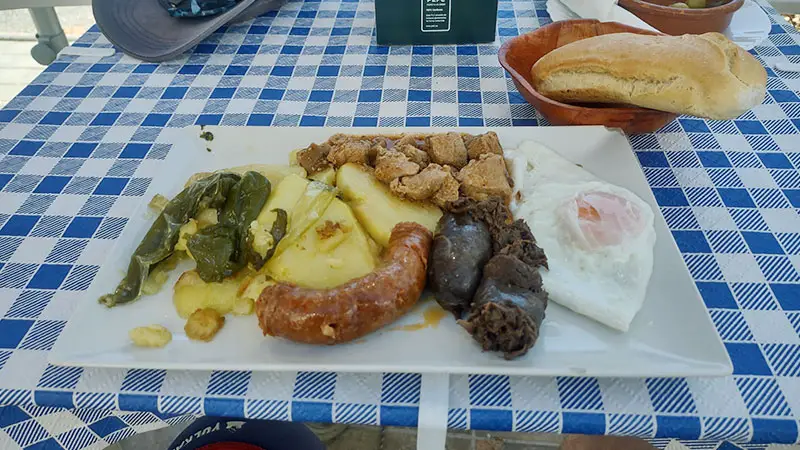
Exploring a Mediterranean Diet meal plan can simplify incorporating nutrient-rich foods. Here’s a detailed 7-day plan to get you started.
Day 1
- Breakfast (453 calories): Enjoy a bowl of Greek yogurt topped with fresh berries and a drizzle of honey. Add a handful of chopped nuts for extra crunch.
- A.M. Snack (39 calories): Munch on a small apple to keep your energy levels steady.
- Lunch (325 calories): Prepare a mixed greens salad with cherry tomatoes, cucumbers, and Kalamata olives. Dress it with olive oil and vinegar. Add a serving of grilled chicken for protein.
- P.M. Snack (106 calories): Opt for a handful of almonds, offering healthy fats and protein.
- Dinner (422 calories): Serve grilled salmon with a side of steamed vegetables like broccoli and carrots. Round off with a quinoa salad including diced cucumber and red onion.
Day 2
- Breakfast (236 calories): Kickstart your day with a slice of whole-grain toast topped with avocado and a poached egg.
- A.M. Snack (73 calories): Nibble on a small pear for a mid-morning refresh.
- Lunch (381 calories): Make a chickpea and spinach stew seasoned with garlic and spices. Accompany it with a slice of whole-grain bread.
- P.M. Snack (77 calories): Grab a small handful of mixed nuts to carry you through the afternoon.
- Dinner (437 calories): Enjoy a hearty meal of whole-wheat pasta with a homemade tomato sauce, adorned with olives and capers. Finish with a simple cucumber and tomato salad.
Day 3
- Breakfast (236 calories): Consume a smoothie made from spinach, banana, and Greek yogurt.
- A.M. Snack (73 calories): Snack on a small bunch of grapes.
- Lunch (381 calories): Choose stuffed bell peppers filled with quinoa, chickpeas, and diced tomatoes.
- P.M. Snack (37 calories): Eat a few carrot sticks, perfect for a light bite.
- Dinner (437 calories): Try a Mediterranean-style baked chicken served with roasted vegetables like zucchini, bell peppers, and eggplant.
Day 4
- Breakfast (236 calories): Pair a bowl of oatmeal with a sprinkle of walnuts and fresh berries.
- A.M. Snack (160 calories): Indulge in a small serving of Greek yogurt and honey.
- Lunch (381 calories): Enjoy a lentil soup made with various vegetables such as carrots, celery, and tomatoes.
- P.M. Snack (73 calories): Pick a small orange to keep things light.
- Dinner (360 calories): Savor a grilled shrimp and vegetable skewer, complemented by a side of couscous and chopped parsley.
Day 5
- Breakfast (236 calories): Relish a smoothie bowl made from blended berries, a banana, and almond milk. Top with chia seeds.
- A.M. Snack (122 calories): Treat yourself to a few whole-grain crackers with hummus.
- Lunch (381 calories): Have a falafel wrap filled with mixed greens, tomatoes, and a dollop of tahini sauce.
- P.M. Snack (45 calories): Snack on cucumber slices.
- Dinner (462 calories): Prepare a baked white fish with a side of sautéed spinach and garlic.
Day 6
- Breakfast (236 calories): Try a slice of whole-grain toast topped with almond butter and banana slices.
- A.M. Snack (73 calories): Choose a small serving of mixed berries.
- Lunch (325 calories): Make a Mediterranean quinoa salad with feta cheese, cherry tomatoes, and black olives.
- P.M. Snack (122 calories): Opt for a handful of roasted chickpeas, perfect for crunch.
- Dinner (472 calories): Serve a roasted lamb chop with a side of whole-grain bulgur and a small Greek salad.
Day 7
- Breakfast (453 calories): Start your morning with a vegetable omelet made from spinach, tomatoes, and feta cheese.
- A.M. Snack (122 calories): Nibble on a few whole-grain pita chips with babaganoush.
- Lunch (325 calories): Choose a tabbouleh salad with plenty of fresh herbs and a light lemon dressing.
- P.M. Snack (45 calories): Munch on a few slices of red bell pepper.
- Dinner (437 calories): Finish your week with a baked eggplant dish topped with marinara sauce and a sprinkle of Parmesan cheese.
Tips for Following the Mediterranean Diet
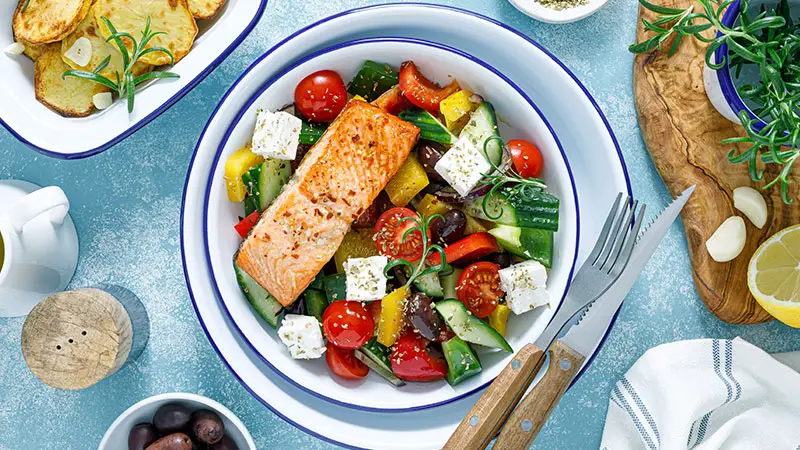
Here are some practical tips for following the Mediterranean diet:
Focus on Plant-Based Foods
Emphasize fruits, vegetables, whole grains, and legumes. Incorporate leafy greens, tomatoes, cucumbers, and bell peppers into your meals. Opt for brown rice, quinoa, and whole-wheat pasta. Add a variety of beans and lentils for protein and fiber.
Use Healthy Fats
Choose olive oil as your primary cooking fat. Sprinkle nuts and seeds on your salads and yogurt for extra flavor and nutrients. Avocados serve as another excellent source of healthy fats.
Limit Red Meat
Consume red meat infrequently. Replace it with plant-based proteins or lean poultry. When you do eat red meat, go for small portions and choose lean cuts.
Eat Fish and Seafood Regularly
Include fish and seafood in your meals at least twice a week. Oily fish like salmon, mackerel, and sardines offer beneficial omega-3 fatty acids. Grilling, baking, or steaming are healthy cooking methods.
Enjoy Dairy in Moderation
Dairy products should be part of your diet but in limited quantities. Choose low-fat or fat-free options like Greek yogurt and feta cheese. These options add flavor without excess calories and fat.
Stay Active
Combine your diet with regular physical activity. Walking, gardening, or even yoga complements the dietary changes. Aim for at least 30 minutes of moderate exercise most days of the week.
Frequently Asked Questions
How many eggs should you eat on a Mediterranean diet?
Limit egg yolks to 4 per week. Egg whites can be eaten in unlimited amounts due to their lower cholesterol content.
What breakfast foods can you eat on the Mediterranean diet?
Consider options like Greek yogurt with fruit, boiled eggs with fresh tomatoes and cucumbers, or leftover homemade hummus with whole-grain toast.
What foods can you and cannot eat on a Mediterranean diet?
Focus on plant-based foods like vegetables, fruits, whole grains, beans, nuts, and olive oil. Avoid processed red meats, heavily processed foods, refined grains, and hydrogenated oils.
Is rice okay on a Mediterranean diet?
Yes, whole grains like brown rice, farro, millet, and couscous are encouraged. Limit refined grains such as white pasta and white bread.
Is peanut butter okay for a Mediterranean diet?
Yes, peanuts and peanut butter can be part of the Mediterranean diet, offering plant-based proteins and healthy fats.
Conclusion
Embracing the Mediterranean diet can transform your eating habits and enhance your overall well-being.
By focusing on whole grains, fresh fruits, vegetables, and lean proteins, you’ll enjoy flavorful and nutrient-rich meals that support heart health and weight management.
Incorporating healthy fats like olive oil and nuts, along with regular physical activity, further promotes a balanced lifestyle.
This diet not only offers numerous health benefits but also encourages home cooking and communal meals, fostering stronger connections with loved ones.
With a structured approach to food intake and practical tips, adopting the Mediterranean diet becomes an enjoyable and accessible journey toward better health. Dive into this vibrant lifestyle and start reaping the rewards today.
